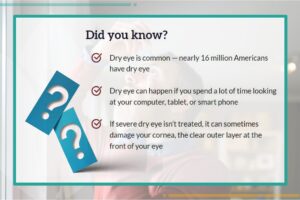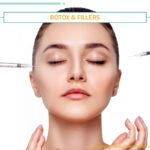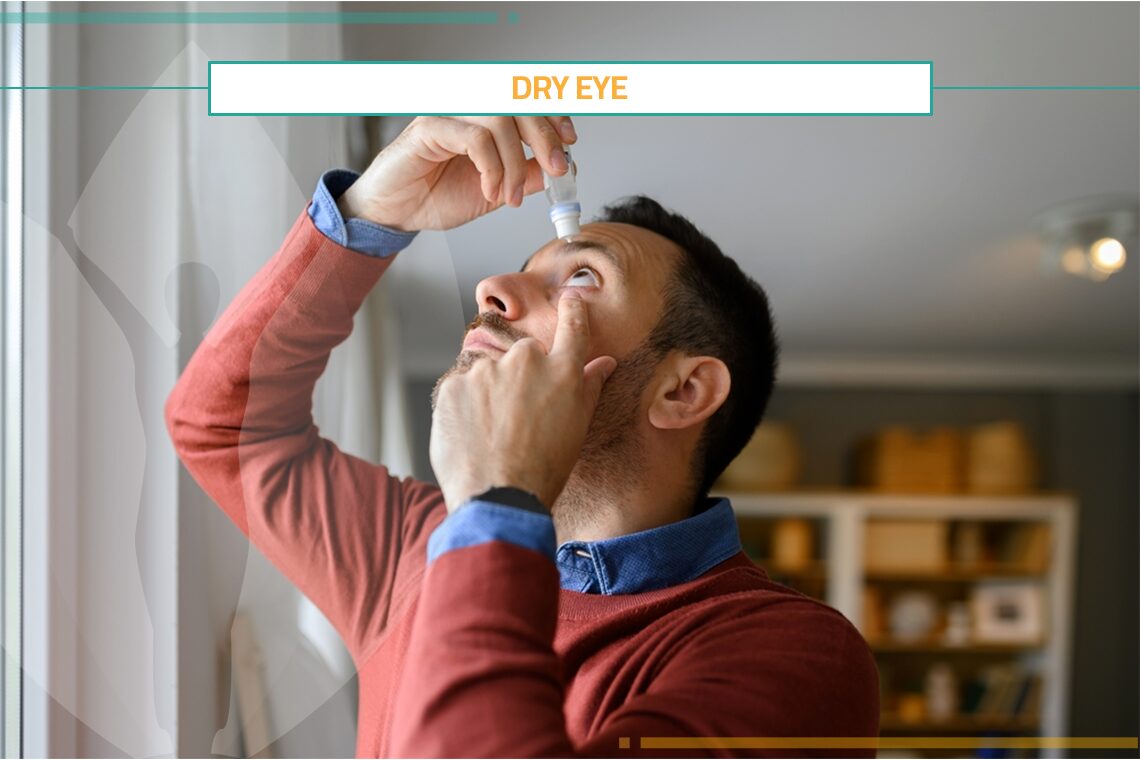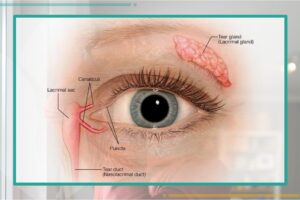hat Is Dry Eye?
When your eyes don’t produce enough tears to stay moist or when your tears don’t function properly, you get Dry Eye. This may cause discomfort in your eyes and, in certain situations, lead to visual issues.
It’s common; millions of Americans suffer from dry eye annually. Fortunately, there are numerous ways to maintain the health and comfort of your eyes if you suffer from dry eye.
What Signs of Dry Eyes Do You Have?
Dry eyes may result in:
– A scratchy sensation as if something were in your eye
– Scorching or stinging sensations in your eyes
– Bloodshot eyes
– Light Sensitivity
– Blurry vision
How Will my Ophthalmologist Examine me for Dry Eye?
As part of a thorough dilated eye exam, your doctor can check for dry eye. Your doctor will give you eye drops to dilate (widen) your pupil and then examine your eyes to look for dry eye and other eye conditions. The exam is straightforward and painless.
Find out what to anticipate from a thorough dilated eye examination. In the event that you suspect dry eye, make sure your physician is informed. If your doctor suspects dry eye, they may undertake the following tests:
– The quantity of tears in your eyes
– The duration of time it takes for your tears to stop
– The composition of your eyelashes
Dry Eyes
A common illness known as dry eye disease arises when your tears are insufficient to lubricate your eyes adequately. For a variety of reasons, tears may not be sufficient or steady. For instance, inadequate tear production or low-quality tear production might lead to dry eyes. The instability of tears causes inflammation and surface damage to the eye.
It hurts to have dry eyes. Your eyes may burn or sting if they are dry. In some circumstances, such as while riding a bike, in an air-conditioned room, on an airline, or after staring at a computer screen for a few hours, you can get dry eyes.
Dry eye treatments could help you feel more at ease. Eye drops and changes in lifestyle are possible treatments. It’s possible that these steps will be necessary for the rest of your life to manage your dry eye problems.
Dry Eye Reasons
Many factors that disturb the normal tear film can lead to dry eyes. Three layers make up your tear film: mucus, aqueous fluid, and fatty oils. This mixture typically maintains your eyes’ surface moisturized, clear, and smooth. Dry eyes can result from issues with any one of these layers.
There are numerous causes of tear film failure, such as autoimmune diseases, hormonal fluctuations, irritated glands in the eyelids, or allergic eye conditions. Reduced tear production or increased tear evaporation can be the cause of dry eyes in certain people.
* Reduced tear production: When you don’t generate enough aqueous fluid, or liquid tears, you may have dry eyes. Keratoconjunctivitis sicca is the medical word for this condition, pronounced ker-uh-toe-kun-junk-tih-VY-tis SIK-uh. Typical reasons for reduced tear production are as follows:
* Growing Older: Certain illnesses, such as sarcoidosis, thyroid issues, lupus, rheumatoid arthritis, scleroderma, graft versus host disease, Sjogren’s syndrome, or vitamin A deficiency
A few medications, such as hormone replacement therapy, decongestants, antidepressants, antihistamines, and medications for high blood pressure, acne, birth control, and Parkinson’s disease.
* Corneal nerve desensitivity brought on by wearing contact lenses, injury to the nerves, or laser eye surgery, however the symptoms of dry eyes associated with this treatment are typically transient.
Read all relevant details about Gluten Intolerance
Why Does Dry Eye Occur?
Normally, tears are produced by glands above the eyes to keep the eyes moist. When your tears don’t accomplish their job, you get dry eyes. This could imply:
– Not enough tears are produced by your glands to keep your eyes moist.
– Your tears end up drying up too quickly.
– It’s like your tears don’t function well enough to keep your eyes moist.
How Do Tears Form?
Tears form a film over the eye when you blink. This maintains the cornea’s surface clear and smooth. For clear eyesight, the tear film is essential.
There are three levels to the tear film:
– Greasy coating.
– Moist layer.
– Coating of mucous.
– Every layer in the tear film has a specific function.
The outermost layer of the tear film is the greasy layer. In addition to preventing tears from drying out too rapidly, it smooths the tear surface. The meibomian glands in the eye produce this layer.
The tear film’s middle layer is the watery layer. Most of what we see as tears is composed of it. By removing foreign objects from the eye, this layer cleanses the lens. The lacrimal glands in the eyelids produce this layer.
The innermost layer of the tear film is called the mucus layer. This keeps the surface of the eye wet by distributing the watery layer over it. Tears would not adhere to the eye without mucus. From mucus, the conjunctiva produces it. This is the transparent tissue found inside your eyelids and covering the white of your eyes.
Normally, in order to stay wet, our eyes continuously produce tears. Tear production is increased when our eyes are inflamed or when we cry. However, occasionally the eyes fail to produce enough tears, or something messes with one or more tear film layers. In those situations, we get dry eyes.
Read about the Dental Implant advantages, types, and candidates
What’s Up with My Dry Eyes? Dry Eye Symptoms
These are a few signs of dry eye:
– Your eyes seem to be burning and stinging.
– Hazy eyesight, particularly when reading.
– There is a sensation of something being in your eye, like it feels scratchy or gritty.
– Mucus strings are present in or near your eyes.
– You have red or inflamed eyes. This is particularly true when you are exposed to wind or smoke from cigarettes.
– Putting on contact lenses hurts.
– Your eyes are filled with tears.
– It may seem strange to have a lot of tears in your eyes when you have dry eye. However, when dry eye irritation aggravates your eyes, more tears are produced.

How Can Dry Eye Be Identified?
Your ophthalmologist will examine your eyes first. They’ll examine the surface of your eyes as well as your eyelids. They’ll also examine your blinking pattern.
The diagnosis of dry eyes can be made with a variety of tests. Your ophthalmologist could conduct an examination to gauge the caliber or volume of your tears. They might also take a look at how quickly you cry.
Tips for Preventing Dry Eyes
- If you can, avoid using a hair dryer.
- Avoid entering extremely heated rooms. Use a humidifier to bring moisture into the air during the winter. Instead, place a pan of water close to the radiator or heater.
- When you are outside, wear wrap-around glasses to shield your eyes from the drying breeze.
- To relieve dry eyes, discuss with your ophthalmologist the possibility of including omega-3 fatty acids in your diet. Flaxseeds and oily fish (tuna, salmon, sardines, trout, and anchovies) are natural sources of them. You can add omega-3 fatty acids as a dietary supplement in the form of pills or tablets.
- Do your eyes feel itchy and dry when you wake up? Just before going to bed, apply thick eye drops or artificial tear ointment.
What Is the Dry Eye Treatment?
Typically, dry eye treatment is based on the underlying cause of your symptoms. Several therapy options are available to assist manage your symptoms and maintain the health of your eyes.
* Commercially available eye drops: Artificial tears are the most popular type of eye drops used to treat mild dry eye. These eye drops are available without a prescription. Moreover, there are over-the-counter moisturizing ointments and gels that might improve the condition of your eyes.
* Prescription drugs: Your eye doctor may prescribe the medications cyclosporine (Restasis) or lifitegrast (Xiidra) if your dry eye condition is more severe. Both of these medications are eye drops that might increase the amount of tears your eyes produce.
* Changes in lifestyle: Your doctor can recommend adjustments to better protect your eyes if something in your life or surroundings is contributing to or exacerbating your dry eye.
What to Do to Treat Dry Eye?
For instance, your doctor could advise you to try a new medication if the one you’re on for another medical problem is making your dry eyes worse.
It might also feel better in your eyes if you:
1. Steer clear of the wind, smoke, and air conditioning.
2. To prevent the air in your house from being very dry, use a humidifier.
3. Set screen time limits and take breaks from prolonged screen staring.
4. When outside, wear wraparound sunglasses.
5. Try to get eight or ten glasses of water each day.
6. Make sure you get 7 to 8 hours of sleep every night.
* Tear-off duct plugs: Your doctor could advise inserting special plugs, known as punctal plugs, into your tear ducts—small holes located in the inner corners of your eyes—if your tears are dripping out of them too quickly. Using these plugs can help you contain your tears.
* Surgery: Sometimes, having too-loose lower eyelids might lead to dry eyes by allowing tears to leave your eyes too rapidly. Your eye doctor may recommend surgery to correct your eyelids and assist your tears stay in your eyes if this is the reason behind your dry eye. This is an uncommon form of treatment.
Dry Eye in the Morning
Nighttime Lagophthalmus
Normally, when you sleep, your eyelids shield the cornea from particles and air that could irritate or harm it. The inability to close your eyelids while you sleep is known as nocturnal lagophthalmos, and it is typically caused by a condition involving the muscles or skin around your eyes. This disorder can cause corneal scarring, infections in the eyes, and visual impairment if left untreated.
Inadequate Nighttime Tear Production
You won’t be able to rid your eyes of things that cause inflammation while you sleep if you aren’t making enough tears at night. As people age, their ability to produce tears tends to decrease because of various medical issues or medication adverse effects. Your tear volume may also decrease as a result of increased tear evaporation in certain environmental situations, such as windy and dry climates.
During sleep, it may be difficult to completely close your eyes if you have damaged eyelids. Eyelid damage can be brought on by after effects from surgery, accidents, illnesses, or conditions affecting the eyes, such as optic neuropathy and glaucoma.
Thyroid-Associated Eye Problems
Bulging or protruding eyes are a common sign of hyperthyroidism, or Graves’ disease. This may make it difficult for you to close your eyes at night.
Taking Medication Before Sleep
Certain over-the-counter or prescription drugs may cause dry eyes as you sleep. Among them are:
– Decongestants and Antihistamines
– Medicines for hypertension
– Hormones
– Medication for Digestive Issues
– Analgesics
– Depression-fighting drugs
– Medicines for the Skin
– Drugs Used in Chemotherapy
– Antipsychotic Drugs






